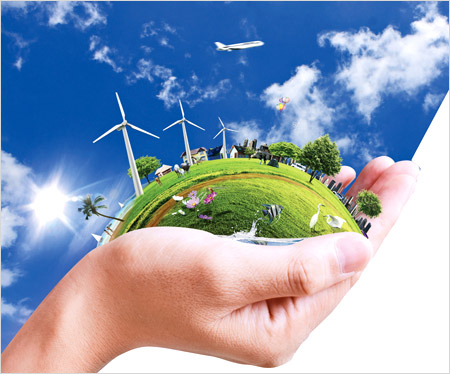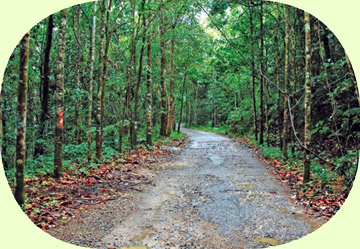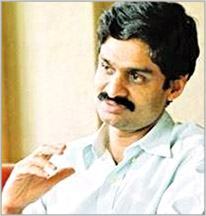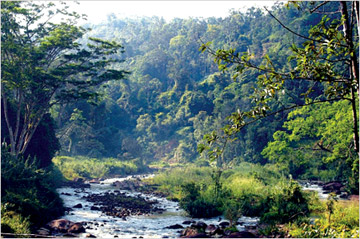|

June 5 is World Environment Day:
Mind the Gap
Aditha Dissanayake
|

“Earth provides enough to satisfy every man’s needs, but not
every man’s greed.”
- Mahatma Gandhi
|
Think about it. Every passing second it becomes impossible not to
worry about the environment. Just when you feel you know the height of
those waves at Arugambay, the innocent bites of the
 mosquitoes in Sinharaja, the scenic view from the top of the Pidurutalagala mountains,
they let you down. They change and turn into an incomprehensibly
horrible tsunami, life threatening diseases and fatal landslides.
Geologists agree this was true even before humans arrived, but no one
can deny our constant digging, drilling, cutting and clearing have
accelerated the process. mosquitoes in Sinharaja, the scenic view from the top of the Pidurutalagala mountains,
they let you down. They change and turn into an incomprehensibly
horrible tsunami, life threatening diseases and fatal landslides.
Geologists agree this was true even before humans arrived, but no one
can deny our constant digging, drilling, cutting and clearing have
accelerated the process.
Like in an imaginary computer game. I am not sure if such a game
really exists but for the time being let's imagine its called Mihikatha.
In this make believe game, you get 1 point for every year that one human
being is alive on planet Earth. The years begin from 1500 A.D and last
for a 1000 years.
Just as in the real world, the survival of human beings depends on
the people having access to food, water, shelter, safety and other
essentials in this make believe game too. When the game begins, you have
a planet with enormous untapped resources of fossil oil, water, forests,
abundant ocean life and incredible biodiversity on land and sea. There
are no humans at this stage.
As the game progresses and the years tick by, you start earning more
and more points by introducing more and more humans onto the planet. At
one point, you turn on the invention of the combustion engine coupled
with the discovery of oil, and then things really begin to accelerate.
Food production suddenly multiplies, making food resources incredibly
cheap and abundant, leading to a population explosion.
As the points keep racking up, you watch as Mihikatha becomes
increasingly taken over by humans. The forests are cut down and replaced
with farm lands. The once-abundant populations of wild animals are
replaced by concrete highways and housing developments. Oil drilling
rigs pump out a heavy portion of the planet's remaining oil resources.
Population growth
More Advice on saving the environment

* Use Solar Power - Easy to use solar panels are available in the
market for lighting and heating. Using solar power will reduce the usage
of fossil fuels and electricity.
* Energy saving on the road - Walking, cycling, using a car pool,
fuel efficient cars, keeping the car well maintained, driving at a lower
speed or taking public transport, all produce fewer emissions.
* Green buildings - When designing buildings, improve the use of
natural daylight, ventilation in workspace and home environment.
* Switch off electrical appliances rather than keep them on the
standby mode. Computers, monitors, printers, photocopy machines,
televisions, VCRs, DVD players, and microwave ovens should be properly
switched off to save energy.
* Plant a tree - Trees absorb CO2 which will reduce global warming
and it provides other benefits such as shelter, conservation of soil,
retaining water, supply food, wood and fuelwood.
*Ideas for Saving Water - Harvest rain water - Put a barrel on at the
bottom of your gutters and use this water for watering plants, washing
etc. Design buildings to harvest rain water.
* Save water in the garden - Retain rain water in the garden by
facilitating infiltration and reducing the surface flow. If you have to
water the garden, do it during the coolest part of the day or at night
to minimize evaporation. |
|

Prof. Hiran Amarasekera, Head, Department of Forestry and
Environment Science, University of Sri Jayawardenapura |
Your points are really accelerating now as you watch the human
population blow past four billion people, then five, and then six. At
that point, on-screen statistics begin to flash red, warning you that
world's oil, water, food, soil and ocean health are all reaching
critical levels of deficiency. Although you are earning big points from
all the human activity, the environmental cost of supporting all those
people is now threatening the ecological stability of the planetary
ecosystem.
It is at this point you realize that, to beat the high score, you
need to keep your human population alive at some level for the next 500
years, and yet the planet's resources are running out, reaching
depletion in just 50 years or less. What should you do?
You decide to just watch and see what happens. With your eyes fixed
on the screen, the years tick past. Twenty-five years further into the
future, the oil runs out, leaving the humans to face an energy crisis.
Without cheap, plentiful oil, food production grinds to a halt. Mass
starvation takes hold in just one year, leading to disease and the
unleashing of a global epidemic. Over the next five years, the human
population suffers a massive, catastrophic death rate, plummeting to
less than a billion people. Your once-awesome score now looks pitiful.
Human civilization has crashed. Game over.
This is surely the outcome facing modern human civilization. But the
truth is, this is no game. The possibility is very real. Unless
something drastic is done to find a balance between human consumption
and the natural environment that supports us all, planet earth is going
to crash, too.
How can the human species save itself from its own destruction? Prof.
Hiran Amarasekera, Head, Department of Forestry and Environment Science,
University of Sri Jayawardenapura, believes the answer lies in turning
ourselves into Low Impact Individuals. "Environmentally friendly living
not only helps the planet - giving a lighter ecological footprint - but
also provides you a healthy, simple and more economical lifestyle," says
Prof. Amarasekera. "Just a few small changes in your day to day life
will be helpful in addressing some of the global issues such as global
warming and also local issues such as solid waste disposal, energy
crisis, land degradation and water scarcity."
Environmentally- friendly living
Echoing the words of Henry David Thoreau who, at the age of 28 moved
into the tiny cabin he had built at Walden Pond, cleared a field near
the cabin (the land belonged to his friend Ralph Waldo Emerson)and
planted beans and potatoes and turnips with the aim of stripping life to
the bare necessities claiming his acts of self-denial, denied him
nothing; while the townspeople toiled away, slaves to their debts and
accumulated furniture, Prof. Amarasekera too encourages environmentally
responsible Thoreau -like living today in the 20th century. "Anyone can
start environmentally friendly living by doing simple things at home
such as switching off unnecessary lights and appliances, repair broken
taps, save water by turning off the tap when water is not used i.e when
shaving or brushing your teeth."
World Environment Day aims to reduce food waste

Think. Eat. Save. Reduce your footprint. That's the theme of World
Environment Day 2013, to be celebrated on the 5th of June in Mongolia.
The new food-inspired global campaign focuses on the fact that over
one billion tons of food are lost or wasted each year, according to UNEP,
the UN Environment Programme.
The campaign, supported by the Food and Agriculture Organization (FAO)
and others, aims to reduce food loss along the entire chain of food
production and consumption and specifically targets food wasted by
consumers, retailers and the hospitality industry.
"In a world of seven billion people, set to grow to nine billion by
2050, wasting food makes no sense - economically, environmentally and
ethically," said UN Under-Secretary-General and UNEP Executive Director
Achim Steiner.
|
Among the advice Prof. Amarasekera gives are simple decisions like
thinking before you buy at the supermarkets or shopping malls, because
reducing the amount we consume is the first step in reducing waste.
Using reusable goods such as reusable bags (bags made of biodegradable
materials instead of non-degradable bags) would also be of immense help
when it comes to leading a "low impact life".
Other methods that could be used include utilizing a compost bin to
recycle kitchen waste as recycling will reduce the amount of garbage you
dispose as municipal waste. "About 85% of what we throw out from
households are easily biodegradable waste which will provide us
fertilizer for our gardens at no cost. A compost bin takes up maximum 1
sq. m from your garden space. These containers are available in plastic,
concrete or metal in many sizes and to suit your budget." Explains Prof.
Amarasekera.
He also reminds us that we can adhere to "Green living in the digital
age" by using both sides of the paper in printing and photocopying. "In
printing documents, print only the portion that is essential after
editing. Replace e-mail for normal mail wherever possible. Going digital
saves time, paper, storing space and is so much more easy to access than
conventional methods of storing." He adds, "It is trendy too!"
Eating locally, as it has become known, has many virtues, he points
out. It reduces greenhouse-gas emissions, helps small farmers, and
probably encourages a healthier diet. (Who really knows where asparagus
come from?). "Consume Sri Lankan products" advices Prof. Amarasekera.
After all, it is better to take small steps on behalf of the planet
than to do nothing at all. But the hitch is will this be enough? Will
these steps or even bigger ones taken on a global scale, help prevent
the drastic effects of population growth, greenhouse-gas emissions,
logging, overfishing, and, as Prof. Amarasekera tries to straighten out,
sheer self-indulgence? Are we not too late already? Can we reverse the
process we have instigated in bringing about an ecological catastrophe
of unparalleled scope and significance?
There seems no way around it. Planet Earth is on a track headed
straight for destruction. A world-wide collapse is coming sometime this
century.
Correct me if I am wrong. I do hope I am wrong.
[email protected] |





